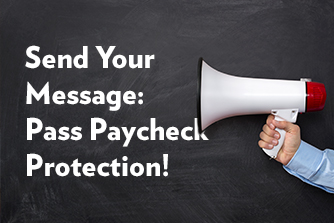Media

Paycheck Protection Benefits Teachers
Providing one more reason Pennsylvania needs paycheck protection, the Pennsylvania State Education Association (PSEA) uses members’ dues to mislead teachers.
In the March 2017 publication of PSEA’s dues-funded magazine Voice, the union claims paycheck protection legislation is “designed to silence the voices of educators, nurses, and first responders.”
The truth? Paycheck protection amplifies members’ voices.
Under SB 166, union leaders, not taxpayers, will take responsibility for collecting PAC contributions and dues used for politics. Teachers will still be able to advocate, lobby, and contact their representatives, but not via taxpayer-funded payroll deductions. These are the rules for every other special interest group, including “big banks and financial companies.”
For example, the thirteen largest banking and financial PACS spent $2.3 million during Pennsylvania’s 2016 election cycle. In comparison, PSEA alone contributed $2.7 million to candidates through their PAC, then spent an additional $5.7 million of teachers’ dues on political activities and lobbying. Paycheck protection would require PSEA’s leaders to ask teachers for political money, just like the banking industry must collect their own political dollars.
There's many more half truths and misinformation in the half-page image, but the most outrageous is PSEA's claim teachers have a choice to join a union and support their advocacy. There’s no choice about it—teachers must pay. Members can either pay dues or pay a fair share fee, which is still 74 percent the cost of full membership.
Teacher's deserve honesty and accountability from their union. Paycheck protection would require union leaders to account for their political spending before automatically deducting it from teachers’ hard-earned paychecks. Ultimately, teachers will still have to pay the union, but they will at least have a choice to support union leaders’ politics.
Sixty-seven percent of Pennsylvania voters want to empower teachers and remove public resources from politics through paycheck protection. The Senate responded and passed paycheck protection in February; now it's up to the House to stop this unethical practice.